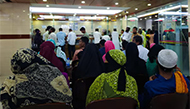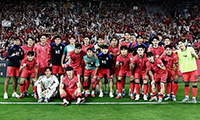On the Soccer Field, Steps to a New Life
The scruffy players in brick-red jerseys and secondhand shoes hailed from Haiti, Togo, Mexico, Honduras and Harlem. The fresh-faced team in black had neatly trimmed hair, new gear and degrees from Carnegie Mellon, Syracuse, Pace and other universities in China and Australia.
Most of the players in black work together at the Royal Bank of Canada, bonded by the financial cloud hanging over their industry. The reds, too, are united by financial circumstance, sharing a temporary address, 1 Wards Island: a homeless shelter.
They faced off on a recent night at Chelsea Piers, perhaps Manhattan’s premier soccer spot for young professionals, and this spring also the base for the newest team in Street Soccer USA, a 16-city network of homeless players that started in 2005 in Charlotte, North Carolina, and is under the umbrella of Help USA, a national homeless services provider.
The idea behind homeless soccer is something like this: Take a group of poor people, disconnected from the regular rhythms of life, lacking both physical exercise and much to look forward to. Add soccer.
In Ann Arbor, Michigan, and Austin, Texas, Minneapolis, St. Louis and Washington, the program has been credited with helping players pull themselves out of homelessness. There is even a Homeless World Cup. This year’s, the seventh, is scheduled for September in Milan.
“When I’m out there, I feel like I can’t do any wrong,” said Dexter Burnett, 47, who played soccer in his native Jamaica. He was laid off last fall from a job as a medical assistant. “It allows me not to think about my situation so much and just relax and enjoy the moment.”
The league is the idea of Lawrence Cann, 31, once a nationally ranked soccer player at Davidson College, in Charlotte. He moved last year to New York, which had one of the nation’s largest homeless populations, estimated at 35,000, but no established homeless soccer team.
With the help of a few volunteers, Mr. Cann cleared out a dusty gymnasium that had previously been used for storage at the shelter on Wards Island, a patch of land in the East River. He recruited a few reluctant players.
At an early practice on a rainy night in March, a couple of the 15 people standing expectantly in a circle had evidently been drinking. Most spoke little English. And they did not even know one another’s names.
“Hey, you,” one player called out before kicking a clumsy pass that landed far from its target.
Taking note, Mr. Cann imported a drill familiar to early practices of soccer teams everywhere: Before making a pass, the kicker had to call out the name of the receiver. He gave instructions in English and Spanish. He declared that anybody who showed up drunk or high on drugs would not participate that night (but could return the next week). And between running, passing and shooting, players are expected to talk to the coach about their goals outside soccer, their job searches and their state of mind.
Of the 30 people who have turned out for a practice, only six have not returned a second time.
“You need something to occupy your time around here,” said Woods Matthews, 45. “That’s why people get so mad around the shelter. We don’t get any exercise, we’re all cooped up, and then people get in fights.”
The homeless players lost their debut game, 14-4, playing without a single substitute. The next week, they faced a team from Bloomberg, the financial information company, whose players were politely intrigued.
“I guess I figure being homeless, they’ll play pretty aggressively,” predicted Louis Brun, 22.
Street Soccer NY lost again, 11-5. As the teams headed to the locker room, Mr. Burnett chatted up an opponent, asking if Bloomberg was hiring.
“If these guys can get out there, feel comfortable talking to new people, and not get frustrated, then it’s really going to help them integrate,” Mr. Cann said. “Then eventually they’ll keep jobs and not get kicked out of their apartments.”
Recently, Street Soccer NY met the team made up mostly of Royal Bank of Canada workers, called the Gunners.
Chris Lodgson, 25, who plays center back on the homeless team, came straight from his new job at the cafe at Bloomingdale’s; he was planning to move from the shelter to an apartment in northern Manhattan. He will continue to play with Street Soccer, which he said has been instrumental in his getting back on his feet.
“I don’t want to say it’s a return to being normal, but it makes me feel like myself again,” he said. “Two weeks ago, that was, like, the first time in a while that I forgot. I forgot where I was and what was going on.”
스마터리빙
more [ 건강]
[ 건강]이제 혈관 건강도 챙기자!
[현대해운]우리 눈에 보이지 않기 때문에 혈관 건강을 챙기는 것은 결코 쉽지 않은데요. 여러분은 혈관 건강을 유지하기 위해 어떤 노력을 하시나요?
 [ 건강]
[ 건강]내 몸이 건강해지는 과일궁합
 [ 라이프]
[ 라이프]벌레야 물럿거라! 천연 해충제 만들기
 [ 건강]
[ 건강]혈압 낮추는데 좋은 식품
[현대해운]혈관 건강은 주로 노화가 진행되면서 지켜야 할 문제라고 인식되어 왔습니다. 최근 생활 패턴과 식생활의 변화로 혈관의 노화 진행이 빨라지고
사람·사람들
more많이 본 기사
- [미주 한국일보 2026년 연중 기획 사업] 매년 풍성하고 유익한 행사… 올해도 한인사회와 함께
- 남궁옥분 “故 송도순, 열흘 전부터 혼수상태..큰 별 졌다”
- 새로운 여명… 이제 다시 희망이다
- [새해 정치 풍향계… 2026 중간선거 전망] 트럼프 2기 중간평가의 시간… 민심은 어디로
- 베네수엘라, 美압박에 맞서 미국인 구금…최소 5명 체포
- [2026 북중미 월드컵 상금은] 6억5천만달러 ‘돈 잔치’… 우승하면 5천만달러
- 2026 북중미 월드컵에서 사용될 공인구는 ‘트리온다’
- 16개 경기장 면면은… LA 소파이 스테디엄에 ‘뜨거운 함성’ 몰려온다
- “박나래 술잔에 맞아 4바늘 꿰매”..전 매니저, 경찰에 상해진단서 제출
- 유승민, ‘李정부 총리 제의설’ 확인… “생각 다른 사람과 일못해”
- 진태현♥박시은, 임신 시도 중단.. “2세 계획, 가슴 무너지지만 멈춰야”
- 첫 무슬림 뉴욕시장 맘다니 취임…쿠란 위에 손 얹고 선서
- AOA 출신 권민아, 의식 회복→충격적 글·사진 삭제.. “눈앞에서 사라질 것”
- 말리·부르키나파소 “미국인 오지마”…美입국 금지에 맞불
- 이혜훈 ‘보좌진 갑질’ 녹취 폭로…국… 1
- 재외동포, 2년 새 7만5천명 줄었다…181개국에 700만 명 거주
- 낸시랭, 사채 빚 15억 떠안았다..오열 고백 “좀비떼처럼 뜯어 먹어”
- LA 올림픽, 도시 전체가 경기장… 한인타운 인근서도 경기
- [미리 보는 2028년 LA 하계올림픽] 역대 최대 규모… LA, 전 세계 스포츠 ‘메카’로
- 지방세 공제한도 1만→4만달러로 상향 1
- 미국·캐나다·멕시코, 2026 북중미 월드컵의 모든 것… ‘축구 대제전’ 전 세계 이목 미국으로
- [새해 암호화폐 시장은 어디로- 현황과 전망] “낙폭 뒤의 기회” vs.“불확실성 당분간 지속될 것”
- “추신수는 지울 수 없는 발자취 남겼다” 美 야구기자, 명예의 전당 투표서 ‘CHOO 선택’ 이유 밝혔다
- 中왕이 “日일부세력, 역사 후퇴 시도…韓, 올바른 입장 취해야”
- 뉴욕증시 주요지수 3년 연속 상승…S&P500 연간 16%↑
- 브라이언트팍서 외국인 관광객 묻지마 칼부림
- 불체자 의심 메디케이드 정보 공유 허용
- [말띠 독자들의 새해 소망·다짐] ‘붉은 말’처럼 역동적으로… 힘찬 도약과 성취를
- 한인 음악인들 ´희망의 선율´ 병오년 새해 밝힌다
- NYPD 무력 사용 역대급 증가
- ‘함께 가는 저녁길’· ‘톰과제리’ 성우 송도순 별세
- 트럼프 “시카고·LA 등서 軍철수…범죄늘면 더 강하게 재배치”
- ‘억’ 소리 나는 ‘개념 부부’..신민아♥김우빈·손예진♥현빈
- 백악관 “미네소타 이어 他민주당 州들… 1
- 이명석 회장, “공금횡령^불법행위 한적 없다“
- 60년만에 은퇴하는 ‘오마하의 현인’ 버핏…누적 수익률은 610만%
- “트럼프 리조트의 마사지사들, 엡스타인에 방문 서비스 제공”
- 트럼프, 집권2기 첫 법안 거부권… ‘보복성’ 권한 행사 논란
- 미국 정부, TSMC에도 美반도체장비 中공장 반입 허가
- 멕시코, 한국 포함 FTA미체결국에 최대 50% 관세
- 코스트코행 40만달러 랍스터 도난당해...‘스푸핑, 위장트럭’까지…워싱턴주 등 미 화물절도 극성
- SF 상공회의소 차기회장에 그린장 SF한인회 부회장
- “AI·소비가 경제 ‘버팀목’… 금리인하로 주택시장 반등”
- 오픈AI 직원, 올해 평균 150만 달러치 주식 받아…역대 빅테크 최고
- ‘붉은 말의 해’ 열리다
- [2026 중간선거 - 뛰는 한인 정치인들] 한인 정치력 신장… 캘리포니아서 도약 이끈다
- 조세호 ‘조폭 연루설’ 털고 빠른 복귀 수순.. ‘도라이버’ 시즌4 합류
- 그레잇넥교회, 더나눔하우스에 후원금
- 새해엔 평화 찾아올까…지구촌 희망 찬 신년 맞이
- 시애틀 다운타운 상권 명암 엇갈려...의류할인점 ‘로스’ 폐점, 노스트랙 이전
1/5지식톡

-
 미 육군 사관학교 West Poin…
0
미 육군 사관학교 West Poin…
0https://youtu.be/SxD8cEhNV6Q연락처:wpkapca@gmail.comJohn Choi: 714-716-6414West Point 합격증을 받으셨나요?미 육군사관학교 West Point 학부모 모…
-
 ☝️해외에서도 가능한 한국어 선생님…
0
☝️해외에서도 가능한 한국어 선생님…
0이 영상 하나면 충분합니다!♥️상담신청문의♥️☝️ 문의 폭주로 '선착순 상담'만 진행합니다.☎️ : 02-6213-9094✨카카오톡ID : @GOODEDU77 (@골뱅이 꼭 붙여주셔야합니다…
-
 테슬라 자동차 시트커버 장착
0
테슬라 자동차 시트커버 장착
0테슬라 시트커버, 사놓고 아직 못 씌우셨죠?장착이 생각보다 쉽지 않습니다.20년 경력 전문가에게 맡기세요 — 깔끔하고 딱 맞게 장착해드립니다!장착비용:앞좌석: $40뒷좌석: $60앞·뒷좌석 …
-
 식당용 부탄가스
0
식당용 부탄가스
0식당용 부탄가스 홀세일 합니다 로스앤젤레스 다운타운 픽업 가능 안녕 하세요?강아지 & 고양이 모든 애완동물 / 반려동물 식품 & 모든 애완동물/반려동물 관련 제품들 전문적으로 홀세일/취급하는 회사 입니다 100% …
-
 ACSL 국제 컴퓨터 과학 대회, …
0
ACSL 국제 컴퓨터 과학 대회, …
0웹사이트 : www.eduspot.co.kr 카카오톡 상담하기 : https://pf.kakao.com/_BEQWxb블로그 : https://blog.naver.com/eduspotmain안녕하세요, 에듀스팟입니다…
케이타운 1번가
오피니언
 정숙희 논설위원
정숙희 논설위원샴페인, 마지막 날과 첫날을 위하여
 조지 F·윌 워싱턴포스트 칼럼니스트
조지 F·윌 워싱턴포스트 칼럼니스트 [조지 F. 윌 칼럼] 저무는 2025년에 안도의 한숨
 김동찬 시민참여센터 대표
김동찬 시민참여센터 대표 [미국은 지금] 책임 있는 자본 없으면 커뮤니티 미래도 없다
 성영라 수필가 미주문협 부이사장
성영라 수필가 미주문협 부이사장 [수요 에세이] 다시, 제자리로 돌아와서
 신경립 / 서울경제 논설위원
신경립 / 서울경제 논설위원 [만화경] 경영자의 ‘문제적’ 사과
 문태기 OC지국장
문태기 OC지국장 한인 정치력 업그레이드 기대
 민경훈 논설위원
민경훈 논설위원세계 역사를 바꾼 동물
 박홍용 경제부 차장
박홍용 경제부 차장 한인사회가 주목해야 할 새해 경제
 박영실 시인·수필가
박영실 시인·수필가 [화요칼럼] 피드백
1/3지사별 뉴스

지방세 공제한도 1만→4만달러로 상향
2026년 새해에도 뉴욕과 뉴저지 한인들의 일상에 크고 작은 영향을 미치는 다양한 규정과 법규가 새롭게 바뀌게 된다. 당장 1일부터 뉴욕시 최…
■ 사고- 한동대·뉴욕한인청소년센터 국제여름캠프

2025 워싱턴지역 10대 뉴스
다사다난했던 2025년이 하루만 남겨둔 채 역사의 저편으로 저물고 있다. 올해의 가장 큰 뉴스는 트럼프 2기 행정부 출범과 함께 몰아친 이민 …
내년 1월부터 달라지는 MD 법안들

‘붉은 말의 해’ 열리다
‘붉은 말의 해’를 알리기 위해 서울에서는 제야의 종이 울리고 부산에서는 화려한 드론쇼가 펼쳐지는등 세계 각국에서 새해를 맞이했다. 2026년…
권혁인 목사 /UMC 한인총회장 /산타클라라 연합감리교회

오늘 하루 이 창 열지 않음 닫기 






















































.png)


댓글 안에 당신의 성숙함도 담아 주세요.
'오늘의 한마디'는 기사에 대하여 자신의 생각을 말하고 남의 생각을 들으며 서로 다양한 의견을 나누는 공간입니다. 그러나 간혹 불건전한 내용을 올리시는 분들이 계셔서 건전한 인터넷문화 정착을 위해 아래와 같은 운영원칙을 적용합니다.
자체 모니터링을 통해 아래에 해당하는 내용이 포함된 댓글이 발견되면 예고없이 삭제 조치를 하겠습니다.
불건전한 댓글을 올리거나, 이름에 비속어 및 상대방의 불쾌감을 주는 단어를 사용, 유명인 또는 특정 일반인을 사칭하는 경우 이용에 대한 차단 제재를 받을 수 있습니다. 차단될 경우, 일주일간 댓글을 달수 없게 됩니다.
명예훼손, 개인정보 유출, 욕설 등 법률에 위반되는 댓글은 관계 법령에 의거 민형사상 처벌을 받을 수 있으니 이용에 주의를 부탁드립니다.
Close
x